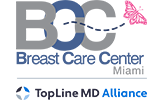Breast engorgement is a common problem that many women experience after giving birth. It occurs when the breasts become swollen, painful, and full of milk, making breastfeeding difficult or even impossible. In this article, our experts at Breast Care Center Miami will explore the causes of breast engorgement and discuss strategies for relieving the discomfort and promoting healthy milk production. If you are a new mom struggling with breast engorgement, this article will provide the information you need to manage this common postpartum issue.
What Exactly Is Postpartum Breast Engorgement?
A couple of days after childbirth, your breasts will begin producing transitional milk, and then mature milk, to replace the colostrum, which is the sticky and thick pregnancy-generated liquid for an infant’s nourishment right after birth. Breast engorgement is usually caused by an increase in milk production triggered by the hormone prolactin after transitioning from colostrum.
When the breasts become engorged, they may feel stiff, swollen, and painful and may appear more prominent and heavier than usual. Engorged breasts can also be tender and warm to the touch, with potentially sore nipples. In some cases, breast engorgement can lead to plugged milk ducts, which can cause further discomfort and may increase the risk of developing mastitis, a breast infection.
It is important for women experiencing breast swelling to seek treatment and support to manage their symptoms and continue breastfeeding if desired.

The Link Between Breast Engorgement and Mastitis
Breast engorgement and mastitis are two common problems affecting women after giving birth. While breast swelling and engorgement are due to the increased production of milk, mastitis is an inflammation of the breast tissue that can occur when a milk duct becomes blocked, leading to a build-up of milk within the breast.
This can cause pain, swelling, and warmth in the affected breast, as well as fever, chills, sore nipples, and flu-like symptoms. You might also feel a firm lump in your breast, which is most likely the obstructed milk duct that led to the mastitis. Breast engorgement and mastitis can occur separately or together.
How Long Does Breast Engorgement Last?
Breast engorgement usually occurs within the first few days after giving birth but can also happen during weaning or when breastfeeding is interrupted or stopped suddenly. Engorgement can make it difficult for the baby to latch on to the breast and feed effectively, and it can also be uncomfortable for the mother.
The duration of engorgement varies from woman to woman, but it usually lasts for a few days to a week and can be relieved with proper breastfeeding techniques and the use of warm compresses and cold packs. It is important to continue breastfeeding or pumping milk to prevent engorgement and to maintain milk supply. If engorgement persists or is severe, don’t hesitate to seek the advice of a healthcare provider or a lactation consultant.
Getting Your Baby to Latch Despite Breast Engorgement
When your breasts are engorged, it can be difficult for your baby to latch on to the breast and feed effectively. The following tips can help you overcome this issue:
- A warm shower or compress before breastfeeding can help soften the breast tissue and make it easier for the baby to latch.
- Hand-express or use a breast pump to remove a small amount of milk from the breast before breastfeeding. This can help soften the areola and make it easier for the baby to latch.
- Position the baby so that their mouth is level with the nipple, with their lips flanged outward and their chin touching the breast.
- Gently guide the baby’s mouth onto the nipple, aiming for their lower lip to be positioned just below the nipple.
- Encourage the baby to take a large mouthful of breast tissue rather than just the nipple. This will help reduce the risk of sore nipples and ensure that the baby is getting enough milk.
- If the baby is struggling to latch or is not getting enough milk, try switching to the other breast or expressing milk to supplement their feeding.
It is important to remember that it can take time for the baby to learn how to latch and feed effectively, especially if you are experiencing breast swelling and engorgement.
Managing and Relieving the Condition
It’s only natural that some women may feel more discomfort during this period than others. To potentially relieve and manage breast engorgement, you can try the following practices:
- Breastfeed or pump milk regularly to help keep the milk flowing and prevent the breasts from becoming too full. It’s best to feed the baby on demand rather than on a set schedule.
- As mentioned, try to make the breast tissue softer before breastfeeding by taking a warm shower or using a warm compress.
- Apply cold compresses or ice packs to the breasts after breastfeeding to help reduce swelling and discomfort.
- Wear a supportive bra that fits well and does not put pressure on the breasts.
- Avoid using a breast pump with a suction setting that is too strong, as this can damage the breast tissue and lead to further engorgement.
- Massage the breasts gently while breastfeeding or pumping to help move the milk through the ducts.
When to Report the Issue to the Doctor?
It is normal for the breasts to become engorged in the first few days after giving birth, but if the condition only worsens, schedule an appointment with your doctor as soon as possible. Here are some signs that you should contact your doctor or a lactation consultant about engorgement:
- The breasts are so hard, swollen, and painful that the baby struggles to latch on to the breast and feed.
- The breasts feel hot and tender to the touch.
- You have a fever or feel unwell.
- You cannot express milk, or the milk flow is very slow.
- You have red, swollen, or painful areas on the breasts or signs of an infection, such as pus or a discharge.
If you are experiencing any of these symptoms, it is vital to seek medical advice as soon as possible. A doctor or a lactation consultant can provide support and guidance on how to manage engorgement and ensure that the baby is getting enough milk. They can also help identify and address any underlying issues that may be contributing to the engorgement.

Contact Us!
The signs of breast engorgement are unmistakable, and you’ll probably know what’s up when it happens to you. We have stated that this condition is a relatively standard occurrence right after childbirth. However, moms should never wait too long to report to their doctor if the swelling, pain, and redness don’t seem to dissipate after a few days.
You are always welcome to schedule an appointment with one of our Breast Care Center Miami experts. We take great pride in providing unparalleled individualized service to our patients.



